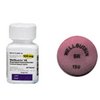INDICATIONS
Wellbutrin SR is indicated for the treatment of major depressive disorder. Wellbutrin SR is an antidepressant. It works in the brain to treat depression.
INSTRUCTIONS
The usual adult target dose for Wellbutrin SR Tablets is 300 mg/day, given as 150 mg twice daily. Dosing with Wellbutrin SR Tablets should begin at 150 mg/day given as a single daily dose in the morning. If the 150-mg initial dose is adequately tolerated, an increase to the 300-mg/day target dose, given as 150 mg twice daily, may be made as early as day 4 of dosing. There should be an interval of at least 8 hours between successive doses.
- Take Wellbutrin SR exactly as prescribed by your doctor.
- Do not chew, cut, or crush Wellbutrin SR tablets. You must swallow the tablets whole. Tell your doctor if you cannot swallow medicine tablets.
- Take Wellbutrin SR at the same time each day.
- Take your doses of Wellbutrin SR at least 8 hours apart.
- You may take Wellbutrin SR with or without food.
- If you miss a dose, do not take an extra tablet to make up for the dose you forgot. Wait and take your next tablet at the regular time. This is very important. Too much Wellbutrin SR can increase your chance of having a seizure.
- If you take too much Wellbutrin SR, or overdose, call your local emergency room right away.
- Do not take any other medicines while using Wellbutrin SR unless your doctor has told you it is okay.
- It may take several weeks for you to feel that Wellbutrin SR is working. Once you feel better, it is important to keep taking Wellbutrin SR exactly as directed by your doctor. Call your doctor if you do not feel Wellbutrin SR is working for you.
- Do not change your dose or stop taking Wellbutrin SR without talking with your doctor first.
STORAGE
Store Wellbutrin SR at room temperature, out of direct sunlight. Keep Wellbutrin SR in its tightly closed bottle. Wellbutrin SR tablets may have an odor. Keep Wellbutrin SR out of the reach of children.
MORE INFO:
Active Ingredient: bupropion hydrochloride.
Inactive Ingredients: carnauba wax, cysteine hydrochloride, hypromellose, magnesium stearate, microcrystalline cellulose, polyethylene glycol, polysorbate 80, and titanium dioxide.



